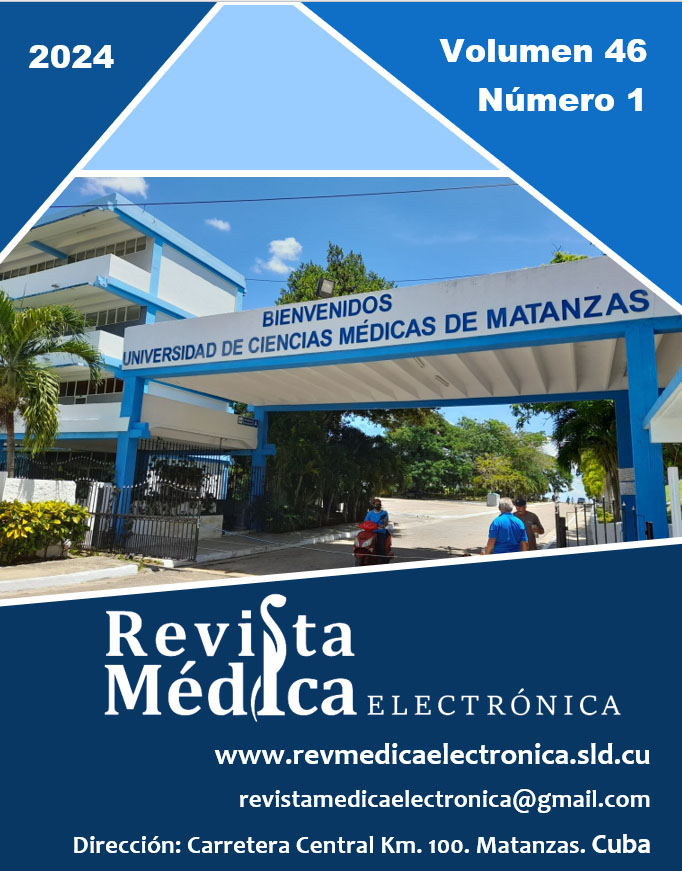Importance of the application of knowledge about Santeria by the physician in the medical interview
Keywords:
medical interview, doctor, patient, believer, natural medicineAbstract
The majority of the Cuban population practices various religious believes. Among those that have a predominance of religious elements from the African component of the Cuban ethnos, Santeria has the largest number of believers. The management of knowledge by the doctor about the material and spiritual aspects of culture, especially about religious themes and with emphasis on Santeria, makes it easier for him, before interviewing his patients, to identify believers or initiates in that religion and the orishas who are their respective objects of devotion. These believers usually imitate in their gestures and personal appearance, as well as in their private and public behavior of daily life, the hagiographic content of their tutelary orishas. The application of this knowledge allows the doctor to obtain preliminary, presumptive information about the behavior, customs, habits, diet, disposition for social relationships and dialogic fluency in the communication of that patient. The objectivity of such information is corroborated by what is provided by the doctor-patient dialogic exchange during the medical interview. The doctor who manages this knowledge and applies it in that interview, has in his favor a high level of probability of communicating quickly and effectively with the patient who is a believer or initiated in Santeria, obtaining an excellent anamnesis, a subsequent diagnosis of high therapeutic value and good acceptance of the indicated medical treatment.
Downloads
References
2. Ortiz F. Contrapunteo cubano del tabaco y el azúcar. La Habana: Editorial de Ciencias Sociales; 1983.
3. González-Betancourt E, García-Baró Y. Mejoramiento del desempeño del especialista en Medicina General Integral en la atención médica integral al trabajador. Educ Méd Super [Internet]. 2022 [citado 10/08/2023];36(1). Disponible en: https://ems.sld.cu/index.php/ems/article/view/2543/1341
4. Velázquez-Tamez L. Convergencias disciplinarias en la formación médica: comunicación y derecho para reducir la práctica médica defensiva. Inv Ed Méd. 2020;9(33):79-88. DOI: 10.22201/facmed.20075057e.2020.33.19182.
5. Rocha-Bastos R, de Oliveira-Botti SH. A entrevista médica. Rev APS [Internet]. 2021 [citado 10/08/2023];24(1). Disponible en: https://periodicos.ufjf.br/index.php/aps/article/view/34786
6. Wenceslau LD, Fonseca VKT, Dutra LdA, et al. Um roteiro de entrevista clínica centrada napessoa para a graduação médica. Rev Bras Med Fam Comunidade [Internet]. 2020 [citado 10/08/2023];15(42):2154. Disponible en: https://rbmfc.org.br/rbmfc/article/view/2154
7. Creagh-Bandera R, Cazull-Imbert I, Creagh-Cazull A. Aprender a preguntar: un recurso didáctico para el aprendizaje de la anamnesis médica. Rev Inf Cient [Internet]. 2020 [citado 10/08/2023];99(2). Disponible en: https://revinfcientifica.sld.cu/index.php/ric/article/view/2911
8. Henry-Knight RH. ¿Es la aplicación de la Semiología Médica una vía de prevención del error médico? Rev Inf Cient [Internet]. 2020 [citado 10/08/2023];99(1). Disponible en: https://revinfcientifica.sld.cu/index.php/ric/article/view/2677/4229
9. Alanís-Reyes M, Hernández-Miranda MB, Godínez-Tamay ED. Identificación de habilidades comunicativas en la entrevista médica en una clínica de consulta externa en Toluca, Estado de México. Aten Fam. 2018;25(2):70-4. DOI: 10.22201/facmed.14058871p.2018.2.63557.
10. Quispe RC, Muñoz EM, Cadillo AV, et al. Percepción de la competencia comunicativa médica durante la entrevista clínica en un hospital docente peruano: validación y aplicación de un instrumento evaluativo. Medwave. 2019;19(9):e7705. DOI: 10.5867/medwave.2019.09.7705.
11. Vega-Hurtado C. Importancia de las estrategias de comunicación entre médico y paciente. Rev Med Inst Mex Seguro Soc [Internet]. 2020 [citado 10/08/2023];58(2):197-201. Disponible en: https://www.redalyc.org/journal/4577/457767703017/html/
12. Morales-Barrabia I, Roiz-Balaguer M, Martínez-Martínez BM, et al. Ética Clínica en la Entrevista Médica [Internet]. La Habana: Instituto de Bioética Juan Pablo II; 2022 [citado 10/08/2023]. p. 15-17. Disponible en: http://www.cbioetica.org/revista/222/1417.pdf
13. Alfonso-González I, Romero-Fernández AJ, Latorre-Tapia LF. Importancia de la historia clínica como instrumento para la recogida de datos en la entrevista médica. Universidad y Sociedad [Internet]. 2021 [citado 10/08/2023];13(S3):129-34. Disponible en: https://rus.ucf.edu.cu/index.php/rus/article/view/2457
14. Santos-Muñoz L, García-Milián A, Marín-Montes de Oca N, et al. Vigilancia de efectos adversos provocados por medicamentos y técnicas de medicina natural. Rev Cubana Med Nat Trad [Internet]. 2019 [citado 10/08/2023];2(1). Disponible en: https://revmnt.sld.cu/index.php/rmnt/article/view/82
15. American Geriatrics Society Beers Criteria® Update Expert Panel. American Geriatrics Society 2023 updated AGS Beers Criteria® for potentially inappropriate medication use in older adults. J Am Geriatr Soc [Internet]. 2023 [citado 10/08/2023];71(7):2052-81. Disponible en: https://pubmed.ncbi.nlm.nih.gov/37139824/
Downloads
Published
How to Cite
Issue
Section
License
All content published in this journal is Open Access, distributed under the terms of the CC BY-NC 4.0 License.
It allows:
- Copy and redistribute published material in any medium or format.
- Adapt the content.
This will be done under the following terms:
- Attribute the authors' credits and indicate whether changes were made, in which case it must be in a reasonable way.
- Non-commercial use.
- Recognize the journal where it is published.
The copyrights of each article are maintained, without restrictions.






